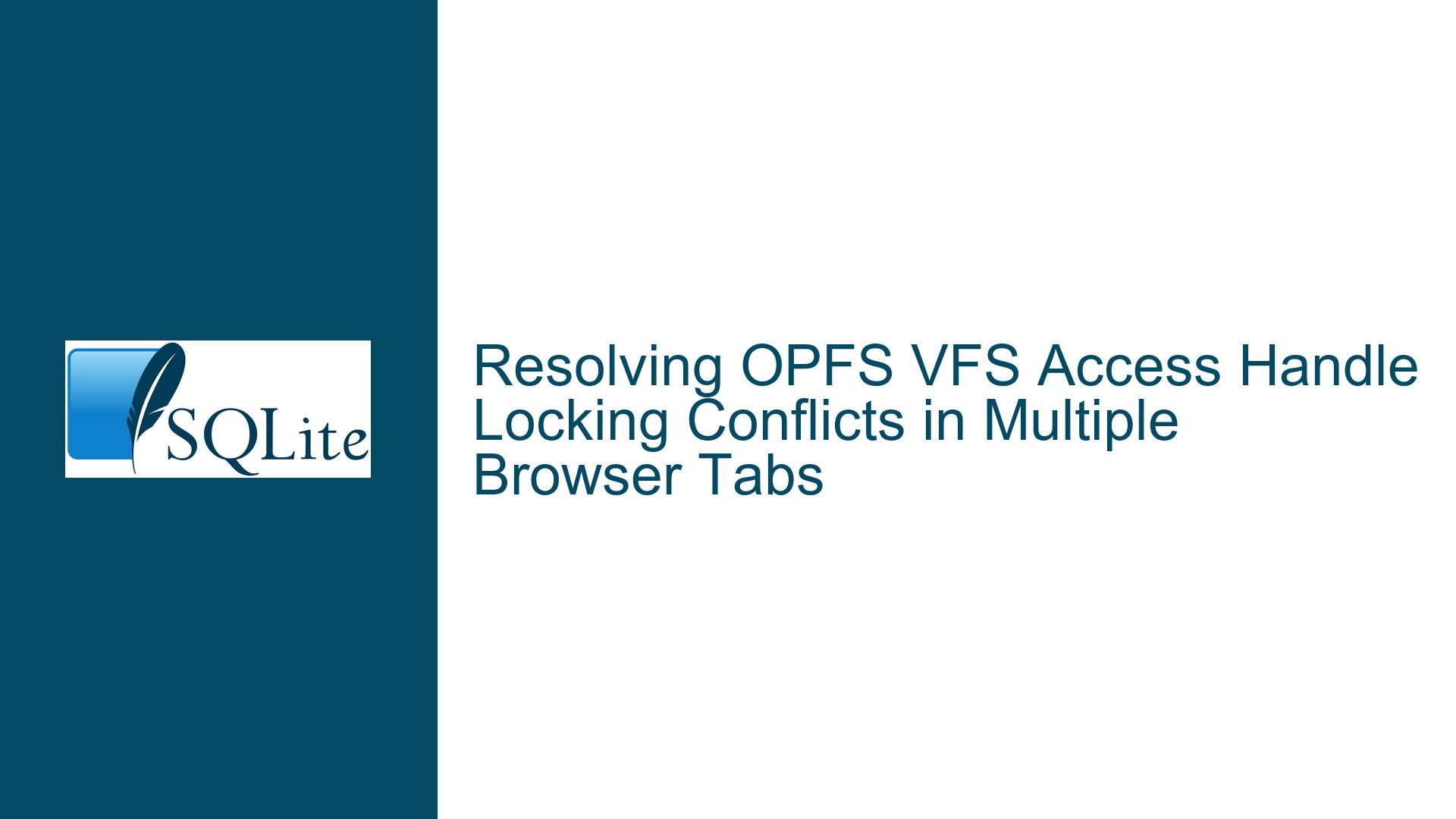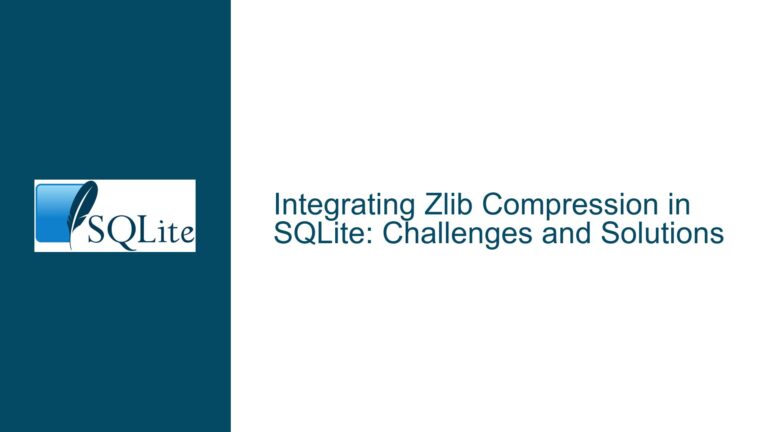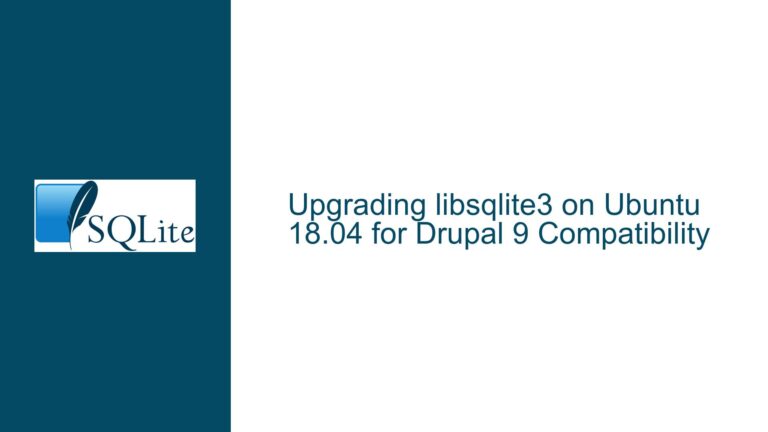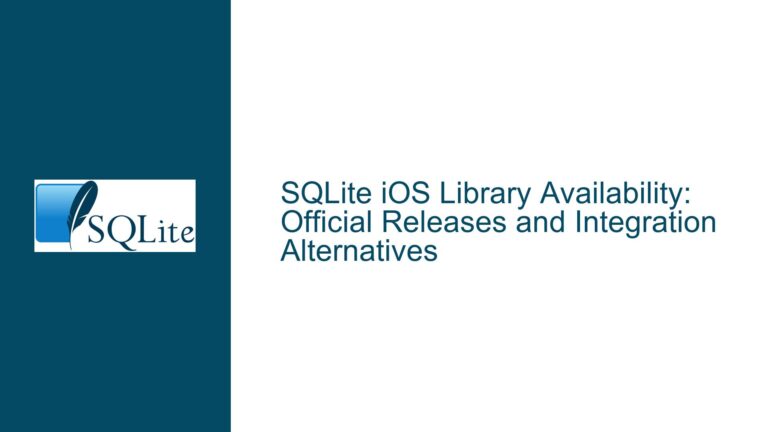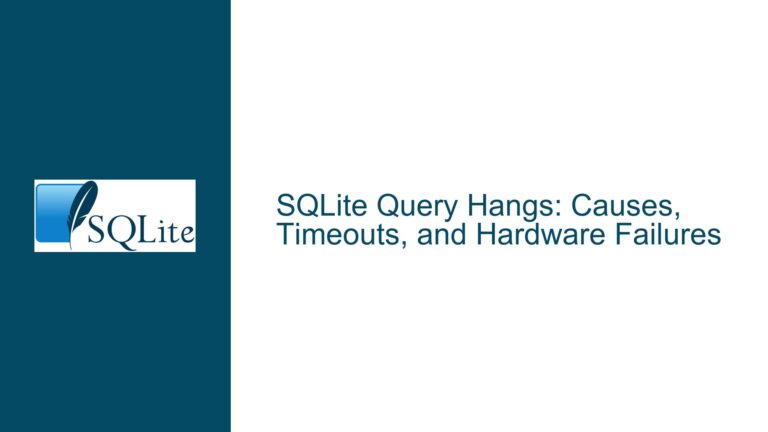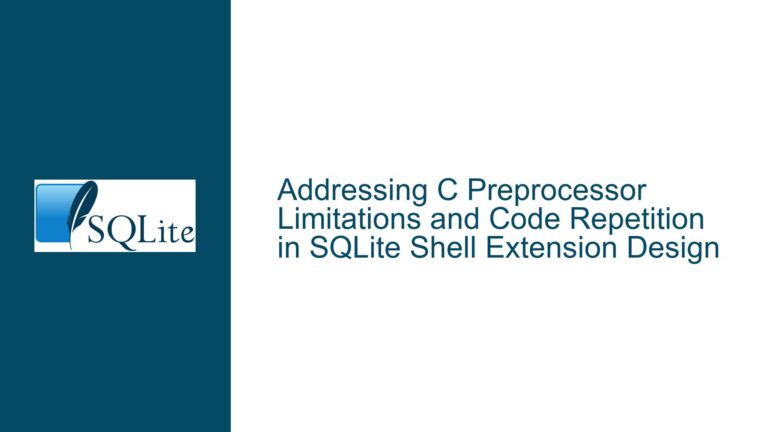Resolving OPFS VFS Access Handle Locking Conflicts in Multiple Browser Tabs
Understanding OPFS VFS Locking Mechanics & Multi-Tab Contention Errors
The core challenge revolves around concurrent access to SQLite databases stored via the Origin Private File System (OPFS) API in web browsers when opened across multiple tabs or windows. The SQLite OPFS virtual file system (VFS) layer attempts to manage file locking to ensure data integrity, but browser-imposed restrictions on OPFS Access Handles create conflicts under specific conditions. When a second tab attempts to open the same database while the first tab holds an implicit or explicit lock, the browser throws a DOMException: Access Handles cannot be created if there is another open Access Handle... error, ultimately surfacing as a SQLite3Error: disk I/O error (code 266). This issue manifests most prominently during write operations (e.g., CREATE TABLE, INSERT) but can also occur during read operations if the VFS layer’s locking logic conflicts with browser-enforced OPFS constraints.
The SQLite OPFS VFS implementation uses a proxy system to bridge SQLite’s synchronous I/O requirements with OPFS’s asynchronous API. When a database operation requires an Access Handle (a browser-granted permission to modify a file), the VFS acquires a synchronous handle through a dedicated Web Worker. If multiple tabs attempt to acquire handles for the same file simultaneously, the browser’s security model prevents overlapping write access, triggering the error. The VFS includes retry logic (4 attempts with increasing delays) to mitigate transient conflicts, but persistent contention exhausts these retries, causing the operation to fail. This behavior is exacerbated by SQLite’s internal locking strategy, which does not always map cleanly to OPFS’s capabilities, particularly for journal file handling.
Root Causes of Access Handle Contention & Locking Limitations
1. OPFS Access Handle Exclusivity & Browser Security Constraints
Browsers enforce strict exclusivity for OPFS Access Handles to prevent data corruption. When a tab acquires an Access Handle for a file, no other tab may obtain a writable handle for the same file until the first handle is closed. The SQLite OPFS VFS attempts to release handles promptly after operations complete, but timing discrepancies arise due to:
- Asynchronous-to-Synchronous Bridging Overhead: The VFS uses
Atomics.wait()and cross-thread communication to simulate synchronous I/O, introducing latency between operation completion and handle release. - SQLite Lock State vs. OPFS Handle Lifecycle Mismatch: SQLite’s
xLock()/xUnlock()calls do not always align with OPFS handle acquisition/release. Journal files (e.g.,*-journal) often bypassxLock(), forcing the VFS to retain handles longer than required to avoid performance degradation.
2. Implicit Lock Retention During Transaction Processing
SQLite’s internal locking hierarchy (RESERVED, PENDING, EXCLUSIVE) is not fully reflected in the OPFS VFS layer. When a transaction modifies the database without explicit BEGIN IMMEDIATE or BEGIN EXCLUSIVE, the VFS may retain an Access Handle for the journal file beyond the scope of individual operations. This creates invisible contention points where subsequent tabs/windows cannot acquire handles, even if the primary database file appears unlocked.
3. Journal File Handling & Lock Escalation
The SQLite write-ahead log (WAL) and rollback journal modes interact poorly with OPFS’s locking model. For example:
- In
journal_mode=TRUNCATE, the journal file remains open during transactions, blocking other tabs from acquiring its handle. - WAL mode requires concurrent access to the
-waland-shmfiles, multiplying the number of Access Handles needed and increasing collision likelihood.
4. VFS Retry Logic Limitations
The default retry strategy (4 attempts with 900ms, 1800ms, 2700ms, 3600ms delays) is insufficient for high-concurrency scenarios. Browser throttling of background tabs and variance in timer precision can cause retries to overlap, leading to starvation.
Mitigation Strategies, Configuration Tweaks & Architectural Adjustments
1. Upgrading to SQLite Versions with Enhanced OPFS Locking
The SQLite team has iterated on OPFS locking strategies in post-3.40.0 versions. Key improvements include:
- Auto-Lock Timeout Reduction: Implicit locks are released after 500ms of inactivity (down from multi-second intervals). Replace
sqlite3-opfs-async-proxy.jswith the version from theopfs-lock-without-xlockbranch to test experimental handle release logic. - Explicit Lock Coordination: Forcing
PRAGMA locking_mode=EXCLUSIVEat connection startup reduces handle contention by discouraging shared locks. This requires app-level transaction batching but minimizes tab-to-tab conflicts.
Implementation Example:
const db = new sqlite3.oo1.OpfsDb('/mydb.sqlite3');
db.exec('PRAGMA locking_mode=EXCLUSIVE;');
2. Leveraging Web Workers for Dedicated Database Access
Isolate database connections within a SharedWorker or dedicated Web Worker to centralize handle management. This avoids per-tab handle acquisition and leverages worker-level message passing for serialized access:
Worker Setup (worker.js):
importScripts('sqlite3.js');
const db = new sqlite3.oo1.OpfsDb('/mydb.sqlite3');
self.onmessage = (e) => {
try {
const result = db.exec(e.data.query);
self.postMessage({ id: e.data.id, result });
} catch (e) {
self.postMessage({ id: e.data.id, error: e.message });
}
};
Tab-Side Access:
const worker = new SharedWorker('worker.js');
worker.port.onmessage = (e) => { /* Handle results */ };
function exec(query) {
const id = Date.now();
worker.port.postMessage({ id, query });
return new Promise((resolve, reject) => {
resultHandlers[id] = { resolve, reject };
});
}
3. Adaptive Retry Configuration & Backoff Strategies
Override the default retry logic with application-specific backoff algorithms. Modify sqlite3-opfs-async-proxy.js to implement exponential backoff with jitter, reducing collision probability:
Modified Retry Logic (Line 63):
function retryWithBackoff(attempt) {
const baseDelay = 300;
const maxDelay = 5000;
const jitter = Math.random() * 300;
const delay = Math.min(baseDelay * Math.pow(2, attempt) + jitter, maxDelay);
return new Promise(resolve => setTimeout(resolve, delay));
}
4. Tab Visibility-Aware Connection Management
Use the Page Visibility API to release database handles when tabs are backgrounded, reducing contention for foreground operations:
document.addEventListener('visibilitychange', () => {
if (document.visibilityState === 'hidden') {
db.close();
} else {
db = new sqlite3.oo1.OpfsDb('/mydb.sqlite3');
}
});
Note: This requires careful state serialization to avoid data loss during reconnection.
5. Journal Mode Optimization & WAL Configuration
Switch to journal_mode=DELETE or journal_mode=MEMORY to minimize journal file handle retention. Avoid WAL mode in multi-tab scenarios unless combined with worker-based access serialization:
PRAGMA journal_mode=DELETE;
6. Proactive Handle Release During Transaction Boundaries
Explicitly close handles after critical operations by triggering artificial lock state changes. This workaround forces the VFS to release OPFS handles:
function withLockRelease(db, callback) {
try {
db.exec('BEGIN IMMEDIATE');
callback();
} finally {
db.exec('COMMIT');
// Force handle release
db.exec('VACUUM');
}
}
7. Experimental Web Locks API Integration
While not yet implemented in the official SQLite build, prototype integration of the Web Locks API can supplement OPFS locking. This requires modifying the VFS layer to coordinate locks across tabs:
Proof-of-Concept Lock Manager:
class LockManager {
async acquire(name) {
return navigator.locks.request(name, { mode: 'exclusive' }, async lock => {
return new Promise((resolve) => {
this._resolve = resolve;
});
});
}
release() {
this._resolve?.();
}
}
// VFS modification point
opfsVFS.xLock = async (fileId) => {
await lockManager.acquire(fileId);
};
8. Connection Pooling & Transaction Queueing
Implement application-level transaction queueing to serialize write operations across tabs using localStorage or BroadcastChannel:
const broadcast = new BroadcastChannel('sqlite-ops');
const operationQueue = [];
broadcast.onmessage = (e) => {
if (e.data.type === 'begin') {
operationQueue.push(e.data);
}
};
async function executeSerialized(query) {
return new Promise((resolve) => {
const opId = Date.now();
broadcast.postMessage({ type: 'begin', id: opId, query });
const checkQueue = () => {
if (operationQueue[0].id === opId) {
db.exec(query);
broadcast.postMessage({ type: 'commit', id: opId });
resolve();
} else {
requestAnimationFrame(checkQueue);
}
};
checkQueue();
});
}
9. Monitoring & Diagnostic Instrumentation
Augment the VFS layer with logging to identify contention hotspots:
// In sqlite3-opfs-async-proxy.js, wrap handle acquisition
const originalGetSyncHandle = getSyncHandle;
getSyncHandle = async (file) => {
console.time('getSyncHandle:' + file.name);
const handle = await originalGetSyncHandle(file);
console.timeEnd('getSyncHandle:' + file.name);
return handle;
};
Analyze console output to detect prolonged handle acquisition times indicative of locking conflicts.
Long-Term Considerations & Browser Evolution
The Chromium team is actively evolving OPFS capabilities, including proposals for:
- Synchronous Access Handle Coordination: Potential future APIs may allow direct handle sharing between workers, bypassing current exclusivity constraints.
- Cross-Tab Lock Observability: Enhanced
storageAPI events could notify tabs of lock state changes, enabling more efficient retry logic. - OPFS Transaction Batching: Atomic multi-file operations would reduce journal-related handle contention.
Until these materialize, the strategies above represent the most robust approach to managing multi-tab SQLite/OPFS contention. Developers must balance locking granularity, performance, and user experience when designing cross-tab database architectures, prioritizing serialized access patterns over true concurrency where feasible.
